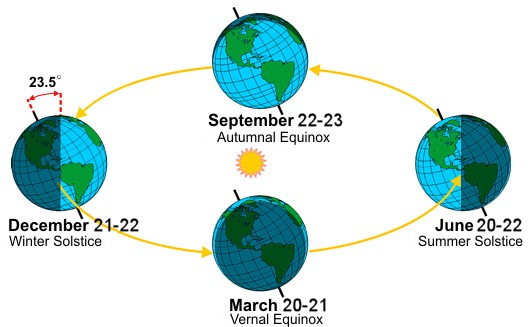Summer Solstice 2024 | 21 Jun 2024
Why in News?
Recently, 21st June has been marked as the day of the summer solstice in the northern hemisphere of the world.
- The summer solstice is celebrated as the beginning of summer, or midsummer when one of Earth’s poles is at its maximum tilt towards the sun.
What is the Summer Solstice?
- Origin:
- Origin of Summer Solstice can be traced to around 200 BC when ancient Greek scholar Eratosthenes, conducted a experiment to measure the Earth’s circumference.
- He observed that on the summer solstice, sunlight shone directly down a well in Aswan, Egypt, indicating the sun was directly overhead.
- By calculating the difference in shadow lengths between Awan and Alexandria cities and the distance between them, Eratosthenes was able to provide an early and accurate estimate of the Earth’s circumference.
- About:
- The summer solstice marks the longest day of the year, when the sun reaches its highest point in the sky.
- During the solstice, the Earth’s axis (around which the planet spins, completing one turn each day) is tilted in a way that the North Pole is tipped towards the sun and the South Pole is away from it.
- Typically, this imaginary axis passes right through the middle of the Earth from top to bottom and is always tilted at 23.5 degrees with respect to the sun.
- At the Arctic Circle(66°33′ north latitude), the sun never sets during the solstice.
- The amount of light received by a specific area in the Northern Hemisphere during the summer solstice depends on the latitudinal location of the place.
- Effect:
- During this, countries in the Northern Hemisphere are nearest to the Sun and the Sun shines overhead on the Tropic of Cancer (23.5° North).
- The Earth rotates on its axis, causing the Northern Hemisphere to receive more direct sunlight between March and September.
- The amount of incoming energy the Earth receives from the sun on this day is 30% higher at the North Pole than at the Equator.
- Cultural Significance:
- In many cultures, summer Solstice is a significant time of the year which marks festivals and rituals across the globe.
Note:
- Summer solstice in the Southern Hemisphere occurs on 22nd December each year.
UPSC Civil Services Examination Previous Year Questions (PYQs)
Prelims:
Q. On 21st June, the Sun (2019)
(a) does not set below the horizon at the Arctic Circle
(b) does not set below the horizon at Antarctic Circle
(c) shines vertically overhead at noon on the Equator
(d) shines vertically overhead at the Tropic of Capricorn
Ans: (a)

